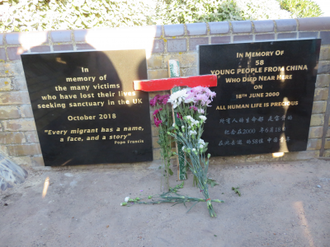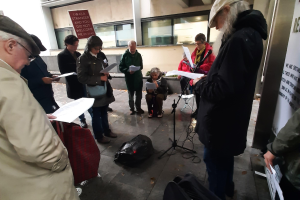Plaque commemorates more than 150 migrants who have died crossing Channel

It's the season of remembrance, and plaque on the Dover seafront remembers the 58 young Chinese who were found dead in the back of an airtight 18m long, Dutch-registered lorry just before midnight on 18 June 2000. There were also two survivors. The grim discovery was made by a single Customs officer, working alone.
There have since been over 150 more deaths during desperate attempts to cross the Channel to claim asylum on UK soil, and a second plaque has just appeared, remembering all the other fatalities. The formal dedication ceremony will take place in December, led by the Bishop of Dover.
However, those 58 deaths - the largest such tragedy along the Channel coast - seem to have been almost forgotten. Yet, as Saint Pope John-Paul II commented at Hiroshima, it is in remembering the past that we commit ourselves to the future We can work and pray for a better future, in which the pressure for such perilous journeys can be eliminated, both here and in the Mediterranean.
In April 2001 the Dutch lorry driver was sentenced to 14 years in jail for manslaughter, and a fellow defendant from Essex, of Chinese extraction, received a six year sentence for conspiring to smuggle illegal immigrants into the UK. In addition, in 2003, nine Chinese gang members were jailed in the Netherlands for their part in the event.
The victims had endured several weeks of arduous travel before making their fateful attempt to enter Britain. They were escorted in small groups from Beijing by snakehead minders after agreeing to pay £20,000 each to be smuggled into the UK.
They started by flying to Belgrade, where they were taken to safe houses and given stolen Asian passports, mainly Korean, and were escorted in small groups into Hungary and then - hidden in vans - through Austria into France, before travelling by rail to Rotterdam, where they were handed over to the European side of the network. They were loaded behind a wooden partition in the lorry, hidden by boxes of tomatoes. The air vent on the side of the trailer was tied open with a piece of string for the three-hour journey to the ferry terminal at Zeebrugge, arriving about 6pm.
The air vent was closed at a motorway service station to avoid the human cargo being spotted at immigration checks - and this was one of the hottest days of that summer, with temperatures well above 25 degrees Celsius. They started panicking after two to three hours because there was no air, kicking the doors, shouting and screaming, but nobody heard and came to help.
The two survivors, pulled out barely conscious by dock workers at Dover after six hours without fresh air, were the last loaded into the container and lay with their heads on the floor by the partition as the air ran out.
For more information see: www.seekingsanctuary.weebly.com


















